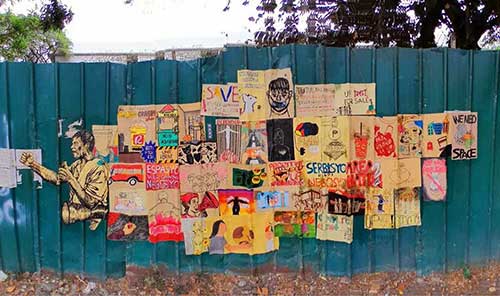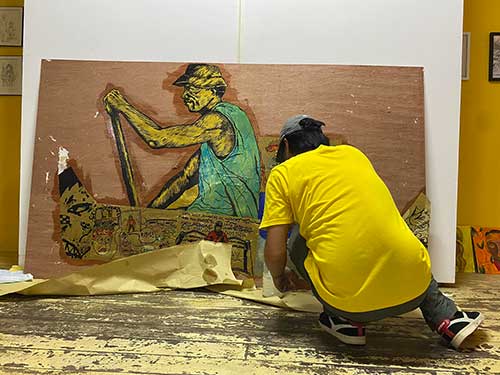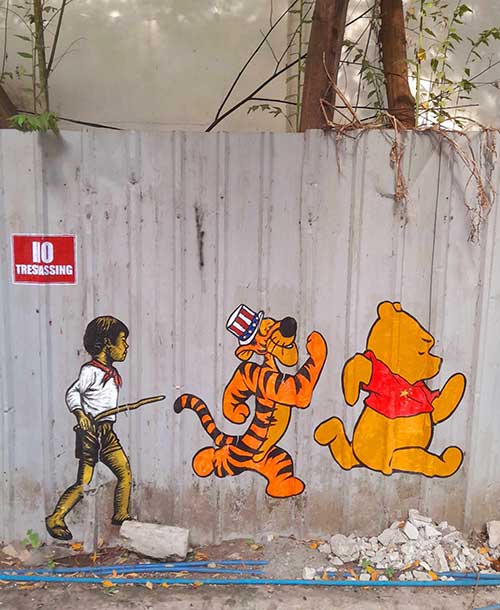By John Anthony S. Estolloso
THRIVE ART Gallery’s ‘Arstoryahanay’ series hosted Bry Barrios and his convo-workshop on Ethics and Aesthetics last July 7 – and while truly yours was expecting a lecture on the philosophical and moral aspects of art, this writer was truly pleasantly surprised that the artist’s exposition on the topics constituted more on his experience of the artist as activist, where the shifting tides of politics, the gray limits of artistic expression, and the redefinitions of aesthetic platforms were put on the center of the conversation.
Simply speaking, Barrios’s artworks are public political statements. A query from the audience mentioned Banksy as a parallel to this approach of the Aesthetic as the Political, and the points of discussion started to coalesce on the theme and topic of that afternoon: if art is meant to be subversive or at the very least, provocative, what are the parameters (if indeed there are any) to its expression, especially if it is situated in full view of the public?
For Barrios’s artworks seem to displace the constructs of conventional visual aesthetics by displaying these in the most unlikely venues. In the process of this displacement, he puts the artwork in the nerve-center of the public eye, provoking thought and perhaps, outrage: not in the gated spaces and ambient lighting of museums or galleries does art blossom but on powerfully rendered sketches on paper pasted on dingy tenement fences encircling alleyways, on the dilapidated galvanized iron and plywood enclosures of constructions sites, on the crumbling walls of abandoned buildings. The praxis of his artwork does not only glean inspiration from its contexts: it embeds and incorporates itself into it.
His characters speak of this incorporation. A boy portrayed garbed a la Katipunero chasing and beating the living daylights out from [a paper] Tigger sporting a Stars-and-Stripes studded top-hat and Winne-the-Pooh with ominous yellow stars surreptitiously gleaming on his red shirt. A tiptoeing child peering through a window to look at some obscura from the dreary coils of our history. A man of the streets sorting trash with sackcloth in hand. World-weary workers sitting on a glaring ‘Never Again’ in recollection of the dark days of the Marcos dictatorship. Solitary figures drawn in pensive or relaxed poses of writing or reading some controversial piece of literature. Through it all, Barrios’s characters are true to life, not because they are idealized archetypes; rather, they capture the common folk in their most common state while in their most profound moments.
Framed by sordid surroundings, there is surprisingly no contrast in the setting of the figures and elements of Barrios’s art. On the contrary, these become complementary fixtures, commenting on the sleazy realities that Filipino society would have desired to extricate itself from but never seem to accomplish. Conversely, they offer a glimmer of hope, that even in such conditions and settings, there is a sort of cold, heroic beauty that shines forth amid the squalor. In the sketches and drawings of Bry Barrios, art becomes an aspiration – in the figuratively respiratory sense – of the aspirations of the people.
* * * * *
While much of the conversation that afternoon focused on Barrios’s personal experiences, inspirations, methods, and praxis of his art, it also provided a platform for encounter and engagement to the audience: on pieces of manila paper, the listeners were given a chance to also created and expressed their sentiments on a particular theme (a most timely one too: the West Philippine Sea debacle); after having rendered the sketches and colors on paper, these were pasted together with an imposing paddler – an homage to the brave fishermen of our shoals – rendered by Barrios in a muralistic collage where sundry understandings of the issue are tied coherently by its visual elements.
It was rather heartwarmingly avant-garde to find artists, university students, activists, teachers, and art enthusiasts rubbing elbows in participation of making the artwork. Rarely do the lines between the artworld are blurred in the actual creation of the art and on that instance, it worked too well to drive home the point: art for the masses, by the masses. In all appearances, Bry Barrios’s art is out-there – literally and figuratively.
[The writer is the subject area coordinator for Social Studies in one of the private schools of the city. The photos are from Thrive Art Gallery and the artist.]
























